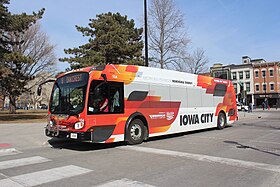The ZX5 is a battery-electric, low-floor transit bus that was developed and originally manufactured by Proterra from 2020, and is since 2024 manufactured by Phoenix Motorcars.
| ZX5 Transit Bus | |
|---|---|
 | |
| Overview | |
| Manufacturer | Phoenix Motorcars (Proterra until 2023) |
| Production | 2020–present |
| Body and chassis | |
| Class | Transit bus |
| Layout | Rear-motor, rear-wheel-drive |
| Powertrain | |
| Electric motor |
|
| Transmission | Eaton EEV-7202 Eaton 4-speed (ProDrive 2.0) |
| Battery | 738 kWh |
| Plug-in charging | 370 kW |
| Dimensions | |
| Wheelbase | |
| Length | |
| Width | 102 in (2.59 m) |
| Height | 128 in (3.25 m) |
| Curb weight | |
| Chronology | |
| Predecessor | Proterra Catalyst |
History
editThis section needs expansion. You can help by adding to it. (July 2024) |
On September 15, 2020, Proterra announced the replacement to the Catalyst, the ZX5, available in 35-and-40-foot (10.7 and 12.2 m) nominal lengths. Edmonton Transit System of Edmonton, Alberta was the launch customer for the 40-foot ZX5.
Background
editDesign updates
editThe ZX5 features the same fiberglass and balsa wood body structure as the Catalyst, but incorporate design changes to both increase battery capacity and standardization with electric vehicle charging protocols. The overall appearance of the vehicle is more angular, while the roof fairing is more streamlined with provisions for roof-mounted battery packs, as well as optional integrated roof charger rails.[1][2] The redesigned roof fairing has decreased overall height by 6 inches (150 mm) compared to the Catalyst.
Multiple battery options are offered on the ZX5, designated ZX5, ZX5+, and ZX5 MAX for the 220, 440, and 660 kWh models, respectively. Each of the three battery options is also offered with one of two drivetrains, which Proterra brands DuoPower or ProDrive.[1][2] The standard ZX5 model, with a 220 kWh energy storage system (corresponding to the previous Catalyst XR model), can travel up to 125 or 120 mi (201 or 193 km) (for the 35 ft or 40 ft models, respectively) on a single charge, depending on the configuration of the vehicle. The ZX5+ model with 440 kWh (corresponding to the Catalyst E2 model) can travel up to 240 or 232 mi (386 or 373 km) (35 ft or 40 ft) on a single charge. The ZX5MAX is the longest-range option available. With 660 kWh, the ZX5MAX can travel up to 329 mi (529 km) on a single charge. The ZX5MAX battery option is only available for the 40-foot length ZX5.
DuoPower models use two independent 205 kW (275 hp) motors, operating at a claimed 13.9 to 25.1 mpg‑e (242 to 134 kW⋅h/100 mi), depending on the battery and body length. ProDrive models use a single 250 kW (340 hp) motor, with slightly lower equivalent efficiency ranging from 13.5 to 23.5 mpg‑e (250 to 143 kW⋅h/100 mi).[1][2] Curb weights range between 26,358 to 29,858 lb (11,956 to 13,543 kg) for the 35-foot models and between 26,649 to 33,350 lb (12,088 to 15,127 kg) for 40-foot models, with ProDrive models being approximately 200 lb (91 kg) heavier than their DuoPower equivalents.[1][2]
In 2022, Proterra introduced an updated ProDrive 2.0 which pairs the motor with a four-speed transmission from Eaton with electric shifting. This new transmission allows buses to climb steeper grades, accelerate faster, and operate more efficiently, extending range.[3][4]
Since Proterra went bankrupt in August 2023, the transit bus manufacturing division was sold to Phoenix Motorcars, under which the ZX5 is now manufactured. The Proterra branding was replaced with Phoenix's own.
Charging
editThe ZX5 can be charged using the SAE J3105 (OppCharge) overhead charging protocol while stopped on a layover (opportunity charging) or while parked in a storage yard, or with a plug-in J1772 CCS DC fast charger when parked in a storage yard.
The ZX5 with any battery option can be fully charged in around 2.9 hours using the OppCharge system, which offers a maximum charging rate of 330 kW.[2][1] Utilizing plug-in charging, the standard ZX5 takes around 2.9 hours to be fully charged, while the ZX5 MAX takes around 4.7 hours to be fully charged at a more limited rate of 132 kW, assuming a 200 A DC power supply.[5][6][7] One CCS charge port is standard at the rear curbside corner, and an additional CCS port can be added either at the front curbside or rear streetside corner.[1][2]
References
edit- ^ a b c d e f g h i "Proterra ZX5 40 foot bus platform specifications" (PDF). Proterra, Inc. Retrieved November 6, 2020.
- ^ a b c d e f g h i "Proterra ZX5 35 foot bus platform specifications" (PDF). Proterra, Inc. Retrieved November 6, 2020.
- ^ Johnson, Peter (September 6, 2022). "A new generation of ENC electric buses will use this American battery tech". Electrek. Retrieved September 7, 2022.
- ^ "The Next-Generation Drivetrain For The Proterra ZX5 Electric Bus". Proterra. April 28, 2022. Retrieved September 7, 2022.
- ^ "Proterra ZX5 – CPTDB Wiki". cptdb.ca. Retrieved September 16, 2020.
- ^ Hawkins, Celeste (September 15, 2020). "Proterra Unveils The Proterra ZX5 Next-Generation Battery-Electric Transit Vehicle". Proterra. Retrieved September 16, 2020.
- ^ "ZX5 Electric Bus". Proterra. September 15, 2020. Retrieved September 16, 2020.